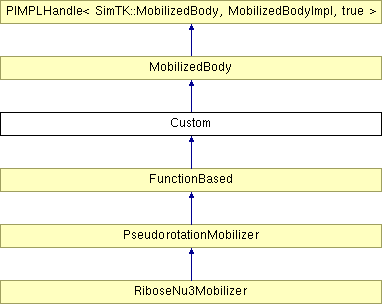MobilizedBody::Custom Class Reference
#include <MobilizedBody.h>
 Inheritance diagram for MobilizedBody::Custom:
Inheritance diagram for MobilizedBody::Custom:Detailed Description
The handle class MobilizedBody::Custom (dataless) and its companion class MobilizedBody::Custom::Implementation can be used together to define new MobilizedBody types with arbitrary properties.To use it, create a class that extends MobilizedBody::Custom::Implementation. You can then create an instance of it and pass it to the MobilizedBody::Custom constructor:
MobilizedBody::Custom myMobilizedBody(new MyMobilizedBodyImplementation(args));
Alternatively, you can also create a new Handle class which is a subclass of MobilizedBody::Custom and which creates the Implementation itself in its constructors.
class MyMobilizedBody : public MobilizedBody::Custom { public: MyMobilizedBody(args) : MobilizedBody::Custom(new MyForceImplementation(args)) { } }
This allows an end user to simply write
MyMobilizedBody(args);
and not worry about implementation classes or creating objects on the heap. If you do this, your MobilizedBody::Custom subclass must not have any data members or virtual methods. If it does, it will not work correctly. Instead, store all data in the Implementation subclass.
Public Member Functions | |
| Custom (MobilizedBody &parent, Implementation *implementation, const Body &body) | |
| Custom (MobilizedBody &parent, Implementation *implementation, const Transform &inbFrame, const Body &body, const Transform &outbFrame) | |
| SimTK_INSERT_DERIVED_HANDLE_DECLARATIONS (Custom, CustomImpl, MobilizedBody) | |
Protected Member Functions | |
| const Implementation & | getImplementation () const |
| Implementation & | updImplementation () |
Classes | |
| class | Implementation |
Constructor & Destructor Documentation
| Custom | ( | MobilizedBody & | parent, | |
| Implementation * | implementation, | |||
| const Body & | body | |||
| ) | [explicit] |
| Custom | ( | MobilizedBody & | parent, | |
| Implementation * | implementation, | |||
| const Transform & | inbFrame, | |||
| const Body & | body, | |||
| const Transform & | outbFrame | |||
| ) | [explicit] |
Member Function Documentation
| SimTK_INSERT_DERIVED_HANDLE_DECLARATIONS | ( | Custom | , | |
| CustomImpl | , | |||
| MobilizedBody | ||||
| ) |
| const Implementation& getImplementation | ( | ) | const [protected] |
| Implementation& updImplementation | ( | ) | [protected] |
The documentation for this class was generated from the following file:

 1.5.6
1.5.6